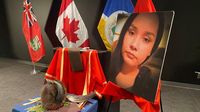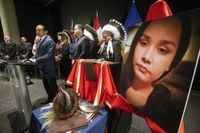WINNIPEG — The name Ashlee Christine Shingoose, once obscured under the title Mashkode Bizhiki'ikwe, or Buffalo Woman, has been restored following a tragic confirmation by the Winnipeg Police Service (WPS) on March 26, 2025. Shingoose, a 30-year-old mother of three from St. Theresa Point Anisininew Nation, was identified as the first victim of serial killer Jeremy Skibicki, who was convicted last summer for the murders of four First Nations women between March and May 2022.
During a poignant news conference, WPS Deputy Chief Cam Mackid expressed hope that the identification would bring a measure of closure to Shingoose's family. “We have never stopped in our efforts to identify Buffalo Woman,” he stated. “For the Shingoose family, my hope is that the news they received yesterday, along with a path forward that we discuss in the coming days and coming weeks, will provide at least a small measure of closure.”
The tragic story of Ashlee Shingoose began when she left her remote home in St. Theresa Point in 2016, seeking a better life in Winnipeg, approximately 500 kilometers away. Unfortunately, her aspirations led her into a perilous situation, as she became one of Skibicki's victims. Shingoose was last seen on March 11, 2022, and her remains are believed to be in the Brady Road landfill, according to police.
At the news conference, Manitoba Premier Wab Kinew announced that the Brady Road landfill would be searched for Shingoose's remains. “I cannot promise you that we will bring her home, but I can promise you that we are going to try,” Kinew said, prompting applause from the audience. He emphasized the importance of recognizing and remembering Shingoose, repeating her name in Anishinaabemowin.
Kinew's commitment to searching the landfill follows a successful operation in December 2024, where the remains of two other victims, Morgan Harris, 39, and Marcedes Myran, 26, were identified after a search of the Prairie Green landfill. The remains of a fourth victim, Rebecca Contois, 24, were discovered in garbage bins near Skibicki's residence.
During the news conference, Shingoose's parents, Albert and Theresa, delivered a heartfelt message through St. Theresa Point Chief Raymond Flett. Theresa expressed the family's long wait for closure, stating, “I need to bring her home. I need that closure. Search the landfill as soon as possible.” Albert, who has tirelessly searched for his daughter, requested Kinew to sing a traditional song, which the premier did, honoring Shingoose's memory.
Shingoose's tragic journey reflects broader issues within Indigenous communities, including the systemic violence faced by Indigenous women. Chief Flett highlighted this ongoing struggle for justice, stating, “It is an ongoing struggle for justice, especially for our young women. Some are still out there missing.”
The WPS's investigation into Shingoose's murder revealed that Skibicki targeted vulnerable women, often at homeless shelters, and disposed of their bodies in nearby garbage bins. The investigation took a significant turn when police received new information during a December prison interview with Skibicki, leading to the identification of Shingoose's remains through forensic testing on a pair of pants linked to her DNA.
Initially, police believed they were close to identifying Shingoose during Skibicki's trial, where she was referred to as Buffalo Woman. Investigators had released images of a Baby Phat jacket, thought to belong to her, but DNA testing on the jacket proved inconclusive. Mackid later confirmed that the jacket was a dead end and that the identification was ultimately made through the pants.
While the confirmation of Shingoose's identity is a step forward, it raises questions about the systemic failures that allowed such tragedies to occur. Winnipeg Mayor Scott Gillingham emphasized the need for recognition of the victims' humanity, stating, “These women are not statistics. They're daughters. They're sisters, mothers, aunties and friends. Their lives mattered and the loss continues to be felt deeply within our own city and throughout the entire province and indeed beyond, throughout our nation.”
The search for Shingoose's remains is part of a larger narrative surrounding the missing and murdered Indigenous women crisis in Canada. Advocates and family members have long criticized the lack of action from authorities, with calls for inquiries into the investigation processes and the treatment of families seeking justice for their loved ones.
In a poignant reminder of the ongoing struggles faced by Indigenous communities, Albert Shingoose shared his heartache and determination to find his daughter. “I wasn’t thinking about being scared or something happening to me, I was thinking of trying to find my daughter,” he said, reflecting on his relentless searches through Winnipeg's streets.
As the community rallies around Shingoose's family, there is hope that the renewed efforts to search the Brady Road landfill will bring some closure to the Shingoose family and shine a light on the urgent need for systemic changes to protect Indigenous women. The commitment from Premier Kinew and the WPS marks a significant step towards acknowledging the past and addressing the ongoing crisis.
Support is available for anyone affected by these reports and the issue of missing and murdered Indigenous people. Immediate emotional assistance and crisis support are accessible through the national hotline at 1-844-413-6649.





